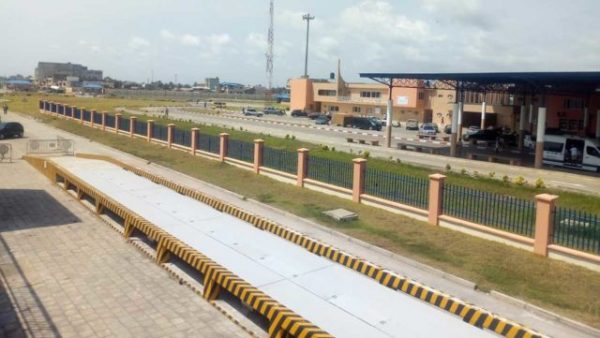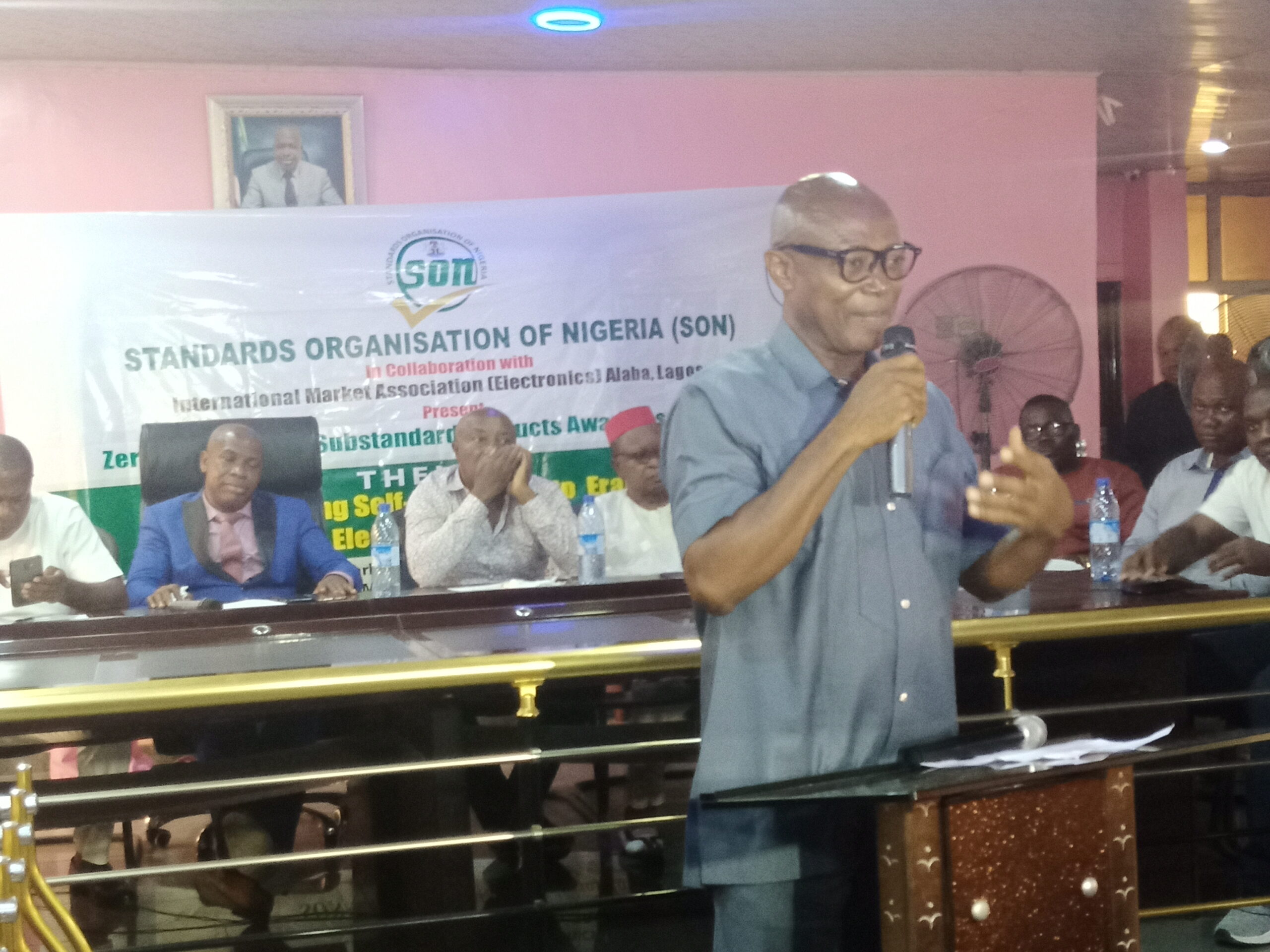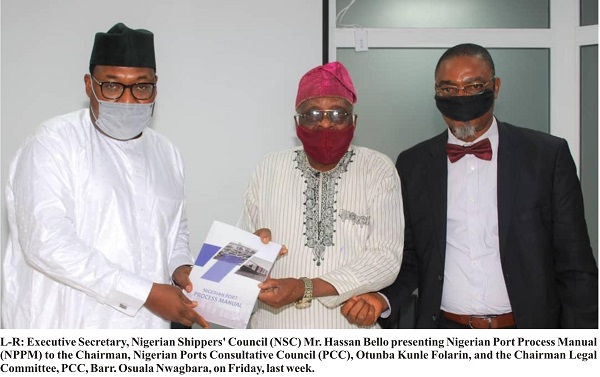Border Closure: “We’ve Seized 2 Trillion Bags Of Poisonous Rice At Seme” – Customs

· 100 illegal migrants arrested, as Customs send more expired rice to IDPs
· FG pledges 35% reduction in shipping lines charges by next month
Nigeria Customs Service (NCS) has said that it had prevented over two trillion bags of toxic rice from entering the country through the land border post, following the Federal Government’s decision to close the land borders on August 21st.
The Controller, Federal Operations Unit (FOU) Zone ‘A’, Compt. Mohammed Aliyu revealed this while briefing Manufacturers Association of Nigeria (MAN) during their 47th Annual General Meeting (AGM).
“I was in charge of Seme border-post for one and half years. If I tell you what goes on there, you will be shocked to hear that. As of now, they have nothing less than 2 trillion bags of rice and that rice is coming to Nigeria and it is poisonous. If you challenge me, I can demonstrate it for you” Compt. Mohammed said told Nigerian manufacturers.
When contacted by our correspondent for proof as pledged in the public forum, the Customs boss renounced his statement, noting that he had exaggerated the figures as the number of bags of rice prevented from entering the country were, “thousands and thousands”
Our correspondent had expected the FOU Controller to have provided the actual figures and proof, after pleading for extra time to meet when initially contacted for clarification a fortnight ago.
Two trillion bags of rice would require over three million trucks to convey across the border, while the sum would also see every Nigerian become a major rice dealer with at least 10,000 bags each for 200 million Nigerians.
This is a propaganda taken too far, observers have noted, as the international community which was well represented at the MAN’s AGM received his claims with intervening cheers tucked in surprises, albeit with a huge impression back to their bases. However, soon after that, the CAC could not prove his claims. With one-month of border closure and its attendant economic losses to the nation and legitimate corporate entities as well as businessmen, stakeholders had expected the government to embark on continuous situation report and assessment with data and facts to back up their claims and actions. Surprisingly, what the NCS came up with was at best, a record of their routine seizures at the border posts, stakeholders have lamented.
Meanwhile, manufacturers who have been shortchanged by this impromptu policy have called on the government to open an avenue that would allow genuine indigenous manufacturers operate their export businesses.
The exercise code-named, ‘Ex-Swift Response’ and tipped to end this week after twenty-eight days, is jointly conducted by the customs, immigration, police and other military personnel and coordinated by the Office of the National Security Adviser (NSA).
Speaking with MMS Plus on the state of affairs at the Seme border, a freight forwarder at the border, Mrs. Stella Romaine said, “There is absolutely no trade across the border but we are counting down to the 28th day which would mark the end of the exercise. One can only cross the border at specific times between 6am-6pm. After 6pm the border is closed totally, no trade is allowed across the border both ECOWAS Trade Liberalization Scheme ( ETLS) export or import. It is sad that this exercise was introduced to curb rice importation via land borders. We can’t stop the import of rice when we don’t have enough and the one made in Nigeria isn’t a popular choice and it isn’t available. If the country had enough rice and it was available, there would be no need for anyone to smuggle it into the country”
“We were told that it is a partial closure and that we could go about our normal business while they carry out the exercise. However, that isn’t the case because there has been no trade across the border. I don’t know what they mean by partial closure. People can cross the border but they are subjected to rigorous checks as the era of Economic Community of West African States (ECOWAS) Trade Liberalization Scheme has been jettisoned. In the past, you could use your passport to get across the border enjoying the ETLS; it’s not like that under this exercise. I saw some officers demanding the passport of a baby less than six months old” she added.
Recall that Comptroller-General of Customs, Col. Hammed Ali (Rtd.), recently stated that the borders will continue to remain close until the countries sharing borders with Nigeria come into terms with the trade conditions laid down by the Nigerian government.
The Customs boss made this known when he visited Maigatari Nigeria/Niger Republic border, saying Nigeria could no longer fold its arms to watch other countries flourish at the detriment of Nigerian economy.
However, according to the Customs Public Relations Officer, DC Joseph Attah, the office of the National Security Adviser (NSA) received reports of large numbers of seizures and arrests from the four sectors of North West, North Central, South West, and South-South geopolitical zones.
“As at 10 September 2019, 100 illegal migrants have been arrested while seizures so far include: 8,360-50kg bags of parboiled foreign rice; 122 bags of fertilizer; 77 vehicles; 781 drums filled with PMS as well as 16, 371 empty 200 litres drums to be used for smuggling PMS; 1,491 packs of assorted drugs; 3 outboard 40HP Engines; 13 cotonu boats; 185 drums of groundnut oil; 6 trucks; 114 motorcycles; among other items with 117 suspects” the report signed by the Customs spokesman said.
“As part of the efforts to sustain the rigorous patrol along the national borderlines, the Comptroller General of Customs, Col. Hameed Ibrahim Ali (Rtd), Comptroller General of Immigration, Mohammed Babandade and the Coordinator of the exercise, Brig Gen Emmanuel Aliyu Ndagi have commenced an on the spot assessment of the implementation and compliance of the ongoing border security drills”
“The exercise is intended to better secure our borders, boost national economy and strengthen border security. Accordingly, we continue to appeal to the patriotic spirit of all Nigerians, especially members of the business community to see the exercise as an opportunity to further create a conducive environment for local businesses to thrive in the overall interest of national security and development”, it stated.
Meanwhile, in another development, Hammed Ali had reiterated that Customs sends expired bags of rice to Internally Displaced Persons (IDPs). He has said this repeatedly.
Recall that the Customs boss made this claim at FOU Ikeja while briefing newsmen on seizures which included foreign bags of parboiled rice, lamented that most of the rice bags had been chemicalized to preserve them as he noted that such chemicals were harmful.
The Customs CG also lamented that most of these bags have been re-bagged on the high seas to conceal the expiry dates from innocent buyers; however, when quizzed about the next line of action on the items, he disclosed that they would be sent to IDPs.
Ali repeated these claims in a recent video produced by News Agency of Nigeria (NAN) which has left a dent on Customs image in the country.
“Any rice you see on the streets in Nigeria that wasn’t produced in Nigeria is smuggled. Imported rice is poisonous. There is no imported rice that comes into the country that hasn’t spent a minimum of five years in silos. Chemicals must have been added to it to sustain its freshness and that chemical is harmful. The bags of rice have also been re-bagged and a false expiry date is given. They do that in Benin Republic and they do it on the high sea. They change the bag and give it a new expiry date. That’s what we consume here and end up with numerous diseases. I appeal to Nigerians to patronize our indigenous rice and by doing that you assist the Customs by making sure that these dealers are pushed out of business,” Ali said in the video.
In another development, as part of efforts to make Nigerian ports more competitive and reduce the cost components at the ports, the Federal Government has assured that the charges collected by shipping lines in the country would reduced by 35% by next month.
The Executive Secretary of Nigerian Shippers’ Council (NSC) Mr. Hassan Bello gave this assurance last week, at the 3rd Maritime Stakeholders Interactive Forum in Lagos, where he noted that the development was a result of fruitful deliberations with shipping companies in recent times.
The NSC boss highlighted container cleaning charges as one of the fiscal components to be expunged from shipping lines charges in the country, noting that the Council had been able to get the shipping companies streamline their sixteen charges to six.
He also stated that similar productive meetings with the Seaport Terminal Operators in Nigeria (STOAN) have held, as both parties have agreed to address the harsh operating atmosphere in Nigeria.
“The cost is driving cargoes out of the Nigerian ports. We have the comparative advantage, so we are negotiating with the shipping companies and we have agreed that 35% of the cost would disappear by next month. They have about sixteen charges but we have agreed to reduce it to six but we have still not agreed on one. That’s with the shipping lines. We have also appealed to the Seaport Terminal Operators in Nigeria (STOAN). The operating atmosphere in Nigeria is very harsh and we have agreed on the need to address this”, Hassan said.
Earlier, the Minister of Transportation, Hon. Rotimi Amaechi expressed displeasure at the slow pace of the $195m maritime security contract awarded to an Israeli company, HSLI since 2017.
Although the Minister disclosed that he would be meeting with the company on Tuesday this week, he said he wasn’t satisfied with the contractor’s excuse that purchasing the equipment for the project was the reason for the delay.
“The contractor claimed that equipment meant for the project is not what you buy off the shelf, which to me is not enough reason for the delay in the take-off of the project. They (HSLI) said they have to fabricate the equipment and bring it down to Nigeria, but we are losing man-hours, human beings and business to insecurity on our waters.” he said.
Amaechi also seized the opportunity to commend the organizers of the Team Maritime Nigeria, a celebration to honour him at the end of his first stint as Transport Minister, however he alluded that he didn’t do much in maritime to deserve such elaborate celebration and encomiums by the stakeholders.
“In my first term as Minister, I completely abandoned the maritime sector to the Heads of Agencies. This time around, that won’t be happening as I have instructed that the Honourable Minister of Transportation for State, Hon. Gbemi Saraki should personally supervise the maritime agencies, while I just oversee what is happening there. I’ll only step in and come in hard when there is need to do so.” he said.
He added that he had discussed with President Mohammadu Buhari to focus on two key issues in this second term as Minister.
“Maritime security and the Single Window projects are the two key issues and I have assured the government that by the end of 2020, we should have the Single Window at our maritime sector. On Tuesday, we got approval to complete the $5.3bn Ibadan to Kano rail project. We have also applied for funding to commence coastal rail for the Port-Harcourt to Warri segment.”
While addressing journalists after the event, the Minister of Transportation for State, Gbemisola Saraki promised to work on issues associated with cadets having sea-time in Nigeria.
“Don’t forget that I chaired the Senate Committee on Marine Transport for four years, so maritime is not new to me. I am just going to take my time because newer issues, like insecurity, have come onboard. We are going to look at the issues of cadets not getting sea-time. We are also going to look at the issues of ship registry and cargo tracking note. We are concerned about how many jobs the various initiatives in the maritime sector will create”, she said.







